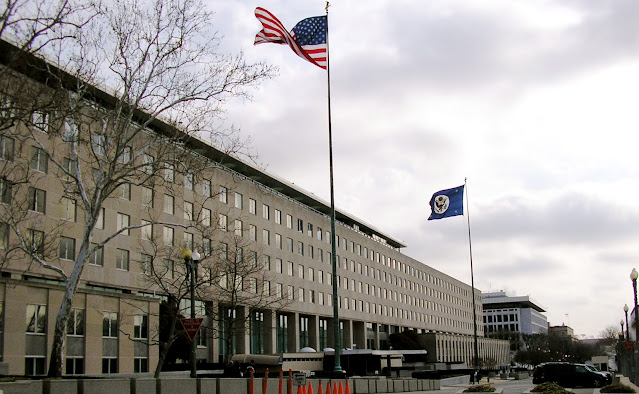
I have almost written this post so many times, but I finally sat down and did it after hearing more about the experiences of some seriously awesome people. If you're a longtime reader of this blog, you may have guessed that I am not a fellow. After all, I've never really mentioned either of the two fellowship programs for those who want to become Foreign Service Officers at the Department of State. Then again, I've recently learned that plenty of fellows are made to feel like they have to hide their fellowship background.
Why is that? Well, it turns out there's some stigma there. People believe there is a difference between how hard it is to get in as a fellow and how hard it is to get in "the regular way". This is probably where I should reiterate the disclaimer on my blog and say that the contents of this blog are my personal opinions and in no way represent the U.S. government or Department of State or fellowship programs in any way. All that being said, I do think there's a difference in difficulty for fellows: they have it much, much harder.
Let me rewind a bit and give a (very brief) overview to the fellowship programs for blog readers who are unfamiliar with them. I'm primarily referring to two different fellowships in this blog post: Pickering and Rangel. (There may be additional fellowships I don't know as much about, but the generalizations I'm making in this post are my personal opinions about Pickering and Rangel fellowships.) The Thomas R. Pickering Foreign Affairs Fellowship "welcomes the application of members of minority groups historically underrepresented in the State Department, women, and those with financial need. Based on the fundamental principle that diversity is a strength in our diplomatic efforts, the program values varied backgrounds, including ethnic, racial, social, and geographic diversity." The Charles B. Rangel International Affairs Graduate Fellowship "seeks individuals interested in helping to shape a freer, more secure and prosperous world through formulating, representing, and implementing U.S. foreign policy. The Program encourages the application of members of minority groups historically underrepresented in the Foreign Service, women, and those with financial need." Those probably sound similar because they are. At the end of the day, both fellowships aim to help diversify the U.S. Foreign Service. Both programs provide financial support for fellows to complete two-year master's degrees, two summer internships, and mentorship and training in preparation for Foreign Service careers.
I was not a fellow, but of course I wanted to be. What person interested in the Foreign Service and applying to graduate school anyway wouldn't want that kind of scholarship, mentoring, and training support? So I did apply to both Rangel and Pickering and I was ultimately not accepted to either one. (Things turned out completely fine for me. I still found scholarships that allowed me to graduate debt-free, I still had great internships, and most importantly I still achieved my dream of joining the Foreign Service anyway. The moral of this part of the story is: don't give up on your dream, even if your dream path doesn't work out! You can still make it!)
So having experienced all of this myself, imagine my surprise when I started hearing things about fellows. I heard a number of misconceptions, but by far the biggest one was that it was easier to get in as a fellow because you don't have to take the FSOT. Take it from me, someone who passed the FSOT all three times I took it and who scored so high on the FSOA (6.0) I was bumped to the top of the Register: it is much harder to get into a fellowship program than it is to crush the FSOT and FSOA. (Moreover, fellows do take and pass the FSOT and FSOA!) I sometimes wonder how many other FSOs applied to Pickering and Rangel and didn't get in but ended up joining the Foreign Service anyway. Because we as a society and as a work culture don't like to talk about rejection or failure, there's no way to know... but I doubt I'm the only one.
Fellows are generally younger and more racially and ethnically diverse than the general pool of non-fellows. Even so, there's absolutely no way to tell if your colleague is a fellow or not unless they tell you. Some people assume that just because someone is young and female and a racial minority that she must be a fellow, but that's simply not true. And over the course of a diplomatic career, how you were hired becomes trivial in comparison to what you've done since.
I do believe the fellowships are needed to help fill a gap where the traditional recruitment process is failing. It's failing (1) to ensure our diplomatic corps looks like the the country it represents and (2) to include people from all walks of life and races and regions and backgrounds so we can all benefit from that collective knowledge, creativity, and decision-making power. The social science research is clear: there is strength in diversity. I for one am honored to call the accomplished, innovative, energetic, and resilient fellows I know my colleagues.
If you're a fellow, please feel free to share my story the next time someone makes a snarky comment. And if you're looking at master's programs and considering the Foreign Service, definitely apply for Rangel or Pickering!
No comments:
Post a Comment